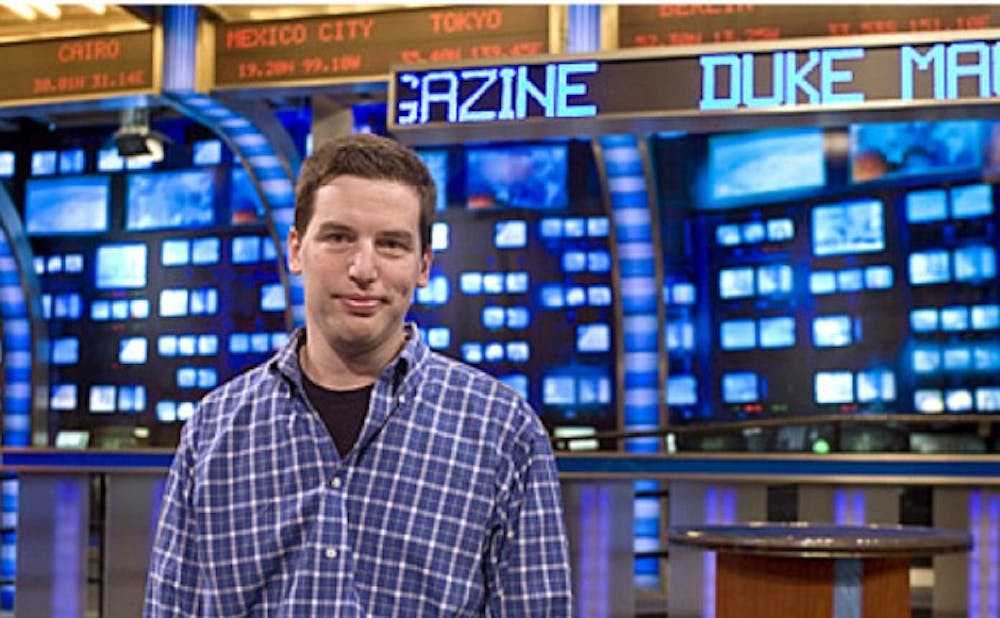Comedy Central comedian Jon Stewart taped his final episode of "The Daily Show" last Thursday, using one of his final segments to implore viewers to remain vigilant against "premeditated, institutional [misinformation] designed to obscure and distract."
Stewart spent the last 16 years doing just that, wielding comedy and satire as a counterweight to politicians, the traditional news media and world events. He got his comedic ammunition from Adam Chodikoff, Trinity '93 and a senior producer at the show, whose responsibilities include digging up joke-worthy material for Stewart and the show's writers and ensuring its accuracy.
"One of Jon’s incredible strengths, out of a multitude, is his devotion to getting things right," Chodikoff said. "I’ve always joked that on my gravestone I want it to read ‘Without credibility the jokes mean nothing’ and Jon has put these values paramount to the show."
Chodikoff's tenure at "The Daily Show" predates Stewart—he joined the staff as a researcher when the show launched with former ESPN personality Craig Kilborn at the desk. Tasked with figuring out how to cross dry issues into the world of late-night comedy, Chodikoff scours major newspapers looking for a set-up, which may be an obscure detail tucked away within the body of a story.
Stewart replaced Kilborn behind the desk in 1999 and the show began to shift toward political comedy, particularly with the build-up to the 2000 presidential election and the controversy that followed. The success of the show catapulted the careers of many of Stewart's correspondents, including Stephen Colbert and John Oliver, who went on to start political satire shows of their own.
Chodikoff often has to dig through the Congressional Record or look for the right audio clip from years past of a political figure contradicting a current remark—an "art form" when done well, he said.
Stewart and the show got more deeply involved on a handful of issues as well, including a December 2010 show devoted to the Zadroga Act, aimed at helping first responders to the September 11, 2001 terrorist attacks now dealing with health complications as a result of their service. The bill was stuck in Congress, but U.S. Senator Kirsten Gillibrand (D-N.Y.) later said on "The Daily Show" that Stewart's work helped give the bill enough votes to be passed and signed into law.
For Chodikoff, the show's coverage of the Zadroga Act, the backlog at the Department of Veterans Affairs and the 2008 financial crisis —all well-chronicled in retrospectives as Stewart entered his final week at the show—rank as hallmarks. But he also points to episodes targeting Hurricane Sandy relief aid and campaign financing as among his personal favorites.
Stewart's take on another esoteric topic, corporate inversions, drew recognition as a notable financial piece.
"Corporate inversions and late-night comedy don’t quite mix, but it involved a lot of research, everything in my research equipment, and it turned out great," Chodikoff said.
The show's commitment to fact-checking caught the eye of Bill Adair, director of Duke's DeWitt Wallace Center for Media and Democracy and the creator of PolitiFact, a fact-checking website.
Chodikoff spoke during the Duke Entertainment, Media & Arts Network weekend in Durham in 2013, using clips from "The Daily Show" to illustrate his role at the show and breaking down the research involved in putting each segment together. Adair was unable to attend, but contacted Chodikoff to learn about how he did his job.
"It was kind of like two chefs comparing kitchen appliances," Adair wrote in an e-mail.
At Adair's invitation, Chodikoff took time out during the last few weeks of Stewart's run to give a similar address as the keynote speaker at the Poynter Institute's Global Fact-Checking Conference last month in London.
The use of video as a form of fact-checking is a different form of drilling down for accuracy than most other attendees, but the entertainment appeal of "The Daily Show" has provided a vehicle to keep people informed.
"Even though Jon Stewart insists they are not journalists, they have really pioneered a new form of comedic journalism that holds politicians accountable for what they’ve said," Adair wrote. "Much of that is fact-checking by showing the hypocrisy of politicians and people in the media."
Entertainment, not fact-checking, still drives the show, Chodikoff said. But there is a firm line that not even the best of punchlines is allowed to cross.
"Jon has even joked on the show about unfortunately having to turn down a great joke because it’s not the truth," Chodikoff said. "I can go in there and discuss an issue with him and he’s willing to listen, and that’s a wonderful quality."
Trevor Noah will replace Stewart as the next host of "The Daily Show" beginning Sept. 28. Chodikoff said it's still too early to tell what the show will hold going forward in its latest incarnation, but his systematic approach to "finding the funny" will continue.
"As outdated as some people view them, I do not: The New York Times, The Washington Post, USA Today, The Los Angeles Times, The Wall Street Journal, they do great work," Chodikoff said. "Great journalism is out there and I’m just trying to emulate them in the comedy setting."
Get The Chronicle straight to your inbox
Signup for our weekly newsletter. Cancel at any time.

